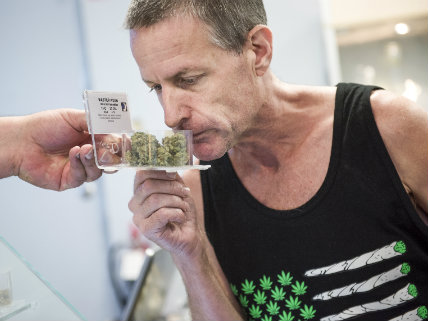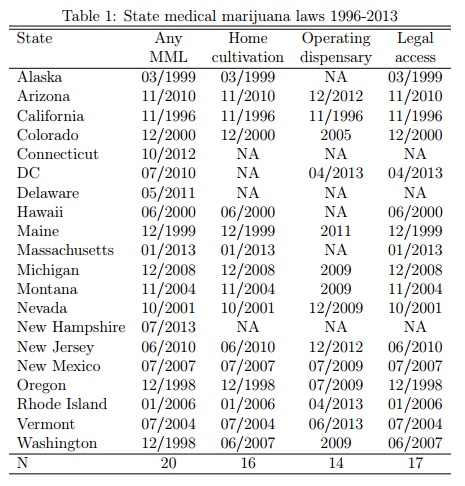Legal Medical Pot Helps Older Americans Remain in the Workforce
Legalizing medical marijuana is associated with 9.4 percent increase in the probability of employment for people over 50.

States with legal medical marijuana have more people over age 50 in the workforce—and they're working longer hours.
The correlation is noted in a study published last month by researchers at Johns Hopkins School of Public Health and Temple University, who analyzed 20 years of data from the national Health and Retirement Study, an annual survey of Americans over 50.
"The enactment of medical marijuana laws was associated with a 9.4 percent increase in the probability of employment and a 4.6 to 4.9 percent increase in the hours worked per week," write researchers Lauren Hersch Nicholas and Johanna Catherina Maclean.
As of 2016, 25 states and the District of Columbia have passed laws to legalize medical marijuana, though the laws differ in terms of which medical conditions are eligible to be treated with marijuana as well as how the drug can be accessed. Studies have shown marijuana to be an effective treatment for pain, anxiety, depression, nausea and sleep disorders, Nicholas and Maclean say. Those kinds of conditions are often chronic and worsen as a person ages, so better treatment options can help older workers say on the job.
That, in turn, puts less stress on welfare and disability programs.
"These effects should be considered as policymakers determine how best to regulate access to medical marijuana," Nicholas and Maclean conclude.
For this study, researchers reviewed workforce data from 1992 through 2012, comparing participation rates before and after those states decided to legalize medical marijuana.

"This study contributes to the growing body of evidence demonstrating that regulating cannabis access is associated with a variety of unanticipated yet positive health and societal outcomes, such as decreased rates of opioid addiction and mortality, fewer workplace absences and reduced Medicare costs," said Paul Armentano, deputy director of NORML, a national pro-legalization marijuana policy organization, in an email to Reason.
There are nine states with marijuana initiatives on the ballot next month. Of those, there are three—Arkansas, Florida and North Dakota—asking voters to decide whether marijuana should be legalized for the treatment of medical conditions.
Editor's Note: As of February 29, 2024, commenting privileges on reason.com posts are limited to Reason Plus subscribers. Past commenters are grandfathered in for a temporary period. Subscribe here to preserve your ability to comment. Your Reason Plus subscription also gives you an ad-free version of reason.com, along with full access to the digital edition and archives of Reason magazine. We request that comments be civil and on-topic. We do not moderate or assume any responsibility for comments, which are owned by the readers who post them. Comments do not represent the views of reason.com or Reason Foundation. We reserve the right to delete any comment and ban commenters for any reason at any time. Comments may only be edited within 5 minutes of posting. Report abuses.
Please to post comments


OT: Public hangings coming back?
http://nbc4i.com/2016/10/07/th.....-old-girl/
If we are going to have the death penalty, I suppose it might as well be a spectacle.
I've often wondered if making executions public and gruesome would make them more or less popular. I could see it going either way.
Monday Night Rehabilitation!
Makes sense with the falling NFL ratings.
I prefer guillotine
It's safer for you and your rights if you continue to buy your pot illegally.
^^^THIS^^^
Free markets, free love!
The first thing that comes to mind is that medical marijuana helps older Americans remain in the workforce because younger potential workers can't pass a drug test.
..or, the older workers are so addicted to the demon weed that they are forced to get a job to pay for their habit.
84% of private employers require a pre-employment drug test, more than 1/3 do random testing.
Holy shit, is it that much?
The first time around, I read the comment to mean that older workers wise in the ways of life were canny enough to pass drug tests regardless.
/perspective
I read it older workers may not pass but they have a medical reason for using pot.
Lol. Humans. We're so weird.
We are. And I am old enough not to care.
As I look at the list of states cited in the articles, it seems that many of the states listed have higher costs of living so it makes sense that older people would need to work.
Kids today...
Just don't know how to roll a proper doobie!
"This study contributes to the growing body of evidence demonstrating that regulating cannabis access is associated with a variety of unanticipated yet positive health and societal outcomes, such as decreased rates of opioid addiction and mortality, fewer workplace absences and reduced Medicare costs," said Paul Armentano
That's just, like, your opinion, man.
Boomers keep working to pay for our dope habits. Duh!
Hold on, HOLD ON! As my sainted mother would say, correlation is not causation. I'm guilty of not reading the linked study, so how do they connect the medical legalization of pot to higher employment rates for those >50 yrs old?
Is it a good thing to have stoned old people in the work force?
It's an entertaining thing, at least.
when i looked at the figure of 14256 dollars .Than I have no other choice but to accept , what i saw .They have been doing this for a year and get rid of their debtts...... Yesterday they purchased new Aston Martin ............. http://www.GoldWAy4.com